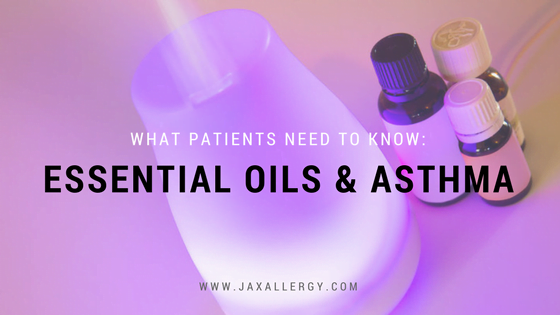What Asthma Patients Need to Know About Essential Oils and Diffusers

Essential oils have been around for centuries, but a new interest is sweeping the market. Maybe you’ve picked up a bottle in the store or attended an essential oil party in the home of a friend. While many benefit claims are unsupported by the Food and Drug Administration (FDA), companies and those who use essential oils claim they help with several conditions including depression/anxiety, headaches, congestion, hormone imbalance, cold sores, high blood pressure, and much more.
What are essential oils?
Essential oils are highly concentrated herbal remedies derived from plants. For example, lavender, eucalyptus, peppermint, orange, and tea tree oil. Many of these oils and others are packaged in blends or sold as single oils for aromatherapy. Oils can be diffused into the air, massaged into the skin, or ingested in a capsule.
Is there evidence that essential oils help asthma?
While individuals and companies (within certain limits) claim essential oils may help a variety of conditions, there is no evidence that essential oils can help asthma. In reality, breathing in the particles released by the oils, or any strong fragrance (natural or otherwise), may trigger bronchoconstriction (i.e. asthma symptoms).
Essential oils are highly concentrated and emit strong odors due to volatile organic compounds (VOCs), including terpenes, toluene, and benzene, when diffused in the air. Terpenes are associated with increased shortness of breath, especially in the evenings (i.e, nocturnal breathlessness) bronchial hyperresponsiveness, and peak expiratory flow variability in patients with or without asthma. There have been anecdotal claims of respiratory issues for people with or without asthma due to airborne irritants from a variety of diffused essential oils.
VOCs within the diffused oils can affect indoor air quality causing a similar pollutant effect as air fresheners, scented candles, and incense. Poor indoor air quality can worsen existing respiratory symptoms from allergies, asthma, and other respiratory illnesses. In addition, some essential oils are harmful to inhale or can irritate the skin. Use on young children may cause severe irritation or could be poisonous if ingested.
Are alternative treatments safe?
Essential oils are not regulated the same way prescription medications are for asthma. Alternative medicine treatments do not undergo scientific review and may not be safe.
There currently is no scientific evidence that supports essential oils help people with asthma. In fact, diffused oils may cause greater harm to those who suffer from asthma. The FDA has issued warning letters to essential oil companies who make unsubstantiated claims about their uses.
Talk to your doctor before substituting an alternative medicine for an asthma medicine prescribed by your doctor. While the oils are considered “natural”, they release VOCs which have been associated with increased asthma symptoms.
Before substituting essential oils for medications, consult with a trained physician. If you suffer from asthma, get clear answers from the Allergy & Asthma Specialists of North Florida. Our doctors specialize in the treatment and management of allergy and asthma symptoms for children and adults. Contact us for more information or schedule an appointment online today.
Sources:
http://www.aaaai.org/ask-the-expert/oil-diffusers-asthma
https://community.aafa.org/blog/asthma-are-essential-oils-harmful-or-helpful
